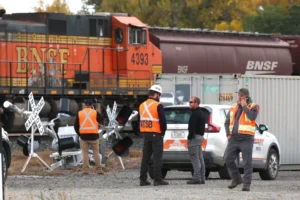A Beef with the System
Why the meat packing houses have a monopoly and are running the table on the rest of us
- Published In: Other News & Features
- Last Updated: Aug 30, 2021
If you had the unfortunate experience of purchasing beef from the grocery store lately, you likely found that it was out of your favorite cut, or that you may need to second mortgage your home to fill your freezer with a side of beef.
We need to talk about what’s really going on here.
National news reports highlight things like workers in Argentina being on strike because of export bans on beef, while a cybersecurity attack shut down our meat-packing industry earlier this year after diesel fuel prices soared through the roof. But there’s far more to the story and far more at stake for us locally. American agriculture is once again in a season of evolution, and Wyoming will feel the ramifications of any shift in this vital industry because it produces so much revenue for our state.
The U.S. Agricultural Department tells us that in 2019, the last year for which figures are available, 12,000 farms and ranches used 29 million acres to raise agricultural products in Wyoming. Farmer and rancher income totaled $1.68 billion in Wyoming. Cattle and calves ranked as the largest livestock commodity raised in the state, followed by hogs and sheep.
The problem is most of those farmers and those in the production line are getting razor-thin profit margins while Fortune 100 companies that control the industry are reaping windfall earnings due to practices that keep the meat in short supply. “Big Beef,” otherwise known as the four companies that own just short of 90 percent of the market in the United States, dictate supply and speed in a market that will pay high prices.
I’ve got a beef with this system: How can we market correct and make fairer an enterprise where only four companies hold a monopoly and dictate virtually every outcome?
I remember growing up on a ranch and my grandparents struggling to keep it profitable. Folks were borrowing tons of money from banks to run huge operations, and the only ones not getting rich were the little guy working day in and day out. Those days are here again under this unfair and unjust system that is stacked against the smaller farms.
The big four companies who dominate the market — Tyson Foods Inc., JBS S.A., Cargill Inc. and Marfrig — are the subject of an ongoing U.S. Justice Department antitrust investigation about alleged predatory business practices after an outcry long building from the public. These four conglomerates have been continually scrutinized over the years from groups calling for their breakup and for rules that would limit their control over the price of live cattle. Of the four companies, JBS and Marfrig are foreign owned while Tyson and Cargill are American owned. I don’t think these companies are in this racket for Americans. They are doing the right thing for their shareholders.
During the COVID-19 crisis, the influence of the big four packers over cattle prices has become more apparent as many packing plants have closed, leaving cattle feeders no options for their slaughter-ready cattle. Boxed beef prices, meaning the packages that consumers buy at the store, have more than doubled in recent months, while live cattle prices dropped by 20 percent or more, and many ranchers who sell cattle for slaughter were unable to obtain bids at live auction, forcing them to feed cattle past their optimum point — lessening the value of the cattle and increasing the feeders’ costs.
“This is becoming a national security crisis,” says Catharine O’Neill, chief executive of Meriwether Farms in Wheatland, Wyoming. If the United States doesn’t have a secure food supply, we are in serious trouble as a nation,” O’Neill says.
Wyoming ranchers aren’t getting rich. Their grain costs are astronomical. If you’re a lucky rancher, your profit is 8 cents a pound. Recently, for ranchers, the break-even point and losses are occurring more often. In an equitable market, those ranchers should be making triple that.
“It is critically important that producers have fair and transparent markets for the commodities they produce,” 16 members of Congress wrote in an open letter March 2, 2021. “We urge the DOJ Antitrust Division to continue vigilance and where possible, provide updates of findings.” The letter was led by U.S. Sen. John Thune (R-S.D.). In addition to Sen. Deb Fischer (R-Neb.), it was also signed by: Sens. John Barrasso (R-Wyo.), Kevin Cramer (R-N.D.), Steve Daines (R-Mont.), Joni Ernst (R-Iowa), Chuck Grassley (R-Iowa), John Hoeven (R-N.D.) and Cynthia Lummis (R-Wyo.) as well as U.S. Reps. Dusty Johnson (R-S.D.), Kelly Armstrong (R-N.D.), Liz Cheney, (R-Wyo.), Randy Feenstra (R-Iowa), Ashley Hinson (R-Iowa), Mariannette Miller-Meeks (R-Iowa) and Matt Rosendale (R-Mont.).
Sen. Fischer introduced the bipartisan Cattle Market Transparency Act of 2021 in March. It will assist in market transparency and push for more investigations.
Having price protections is especially important for small, family ranchers who depend on fair prices to support their families and businesses — which in turn support local jobs and economies, especially in hard-hit rural America, including Wyoming.
It is important to understand the concept of a “cash market,” where commodities are paid for and received at the point of sale; it is crucial to what is called price discovery, because it requires buyers and sellers to negotiate until they agree on a price. Over the last several decades, the cash market has declined in favor of less competitive formula sales, which do not require the same process of bidding and negotiating the price at the time of sale.
The October 2019 fire at a Tyson facility in Holcomb, Kansas, demonstrated the vulnerability of the small monopolized markets. The plant had to close for several months to rebuild it. The closures of processing plants during COVID also prompted revenue declines, price increases and shortages.
Sen. Grassley says this continues to show a wide disparity between the cash-price of fed cattle and the price for boxed beef that you would buy in a grocery store freezer. The cattle producers are getting lower prices from the meat packers, but consumers are being charged higher prices at the grocery store. Many believe it is time for the government to step in and regulate this industry. We must implement key policy solutions to regulate these issues appropriately and protect the American farmer and ranchers. Only time will tell if we can fix this unfair system. Until then, the American rancher, including many in Wyoming, will get the short end of the stick.













